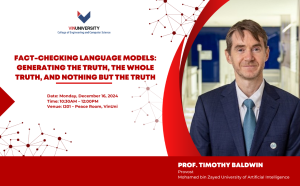[Research Seminar] Rasch measurement to improve fairness in tests – Mr. Daniel Ruelle
| Seminar Title: | Rasch measurement to improve fairness in tests |
| Speakers: | Daniel Ruelle
Director: Teaching and Learning Excellence Center Senior Lecturer: College of Arts & Sciences |
| Time: | Wednesday, June 7, 2023 | 3:30 – 4:30 PM |
| Venue: | C202 Lecture Hall, VinUniversity |
Scenario 1: Student A gets 14/20 on a final exam. Student B does a re-sit with different questions and gets 16/20. Is student B “10% better” than student A? What if the questions were easier / more difficult in the re-sit version?
Scenario 2: A professor co-teaches a class with another professor. When marking final presentations, Prof. A – famous among students for being a “strict marker” – awards one group 79%. Prof. B – rumored to be a “generous marker” – awards 92%. Whose scores are “fair” and “correct”? What if the students in the group are all majors in X, the same field as Prof. B? Is there any hidden bias affecting Prof. B’s scores?
In this research seminar, we will explore these scenarios and how Rasch measurement helps us go beyond traditional test theories, leveling the playing field for all test takers.
By attending this session, you’ll have a better understanding of:
- The core principles of Rasch measurement including invariance, latent traits, fit statistics, and their role in promoting test fairness.
- The limitations of using raw scores and percentages in making assessment decisions.
- How poorly functioning questions can negatively impact test result interpretations.
- Issues with human raters (rater-mediated assessment) and how Rasch can minimize their impact.
- How WINSTEPS and FACETS software can provide insight into your test data to make better assessment decisions.
Analysis data from actual exams will be used in the seminar. The highlight of the seminar will be a practical activity where your anonymous ratings on some sample performances will be analyzed live using FACETS software, showcasing how Rasch measurement can be applied in practice to calculate fair scores, reveal unintentional bias, unreliable test items, and other interesting findings.



